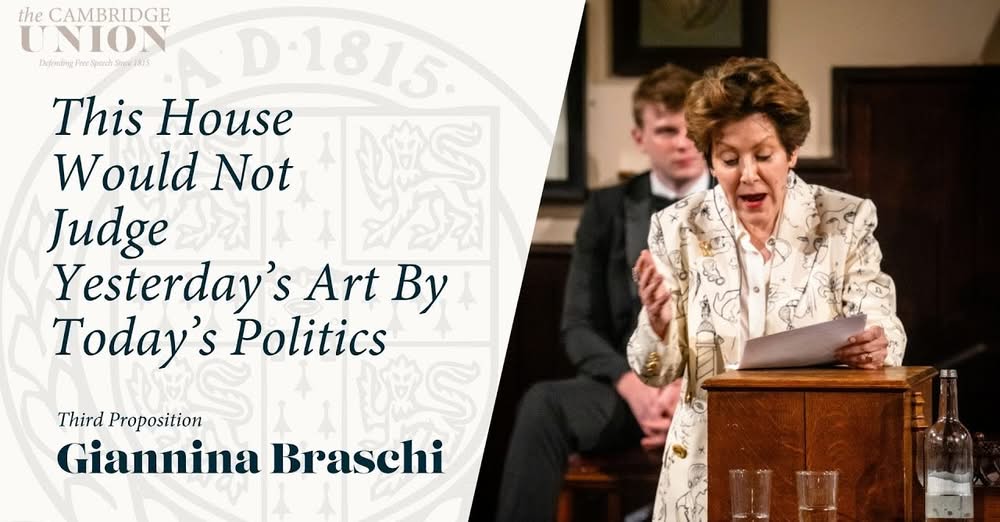Cambridge Debates Moral Standards: Today’s Politics v Yesterday’s Art
Welcome to The Cambridge Union, a unique institution at the heart of Cambridge University. Over the years the Union has hosted some of the greatest figures in the world, such as Robert DeNiro, Ronald Reagan and Winston Churchill – we are part of history.
A members’ society at its heart, the Union has now opened its doors to the wider public and all can now book events, eat and drink, or even become an open member for the opportunity to join the debate.
Giannina Braschi | This House Would Not Judge Yesterday’s Art By Today’s Politics | Cambridge Union
Cambridge Union debates moral standards
Giannina Braschi speaks as the third proposition for the motion on Thursday 19th June 2025 in the Debating Chamber.
Cambridge Union Society Debate Info:
In The Chair: Anoushka Kale Taking the Minutes: Roberta Rennie
- The Debate Motion title is always preceded in context by the phrase “This House Would”, “This Would Believes”, or simply “This House”.
- The Debate motion is typically phrased in Proposition of the argument prior to any votes or speeches, regardless of controversial nature.
- Six 10 minute speeches are given, alternating between each Proposition & Opposition speaker of the Debate Motion.
- The Chair governs authority over interjections, time limits, and any discretions/arrangements agreed between speakers and/or CUS.
- There are two ways interjections can be made by audience members; a Point of Information (upon acceptance from the speaker) or a Floor Speech. (Interjections are not to be interpreted as Audience Questions and can be denied or ignored at discretion of the Speaker or Chair)
- Points of Interest cannot be made during the first & last minutes of any speech, they also must be under 30 seconds and maintain relevance.
(As a result it is impractical to provide microphones for Points of Interest and apologise for any issues with audibility)
- Floor speeches are made by audience members at intervals during the Debate discussing support for Proposition, Opposition or Abstention.
(The Union rarely publishes Floor Speeches due to Release Form arrangements within membership contracts)
- At the end of the Debate, all Speakers and audience members cast their vote as they leave the Debating Chamber through doors labelled “AYES” & “NOES”, with the central door exit representing Abstentions.
- The Chair calls an announcement shortly after the Debate to confirm the votes.
CAMBRIDGE UNION DEBATE Moral Standards
For the Proposition: This House Would Not Judge Yesterday’s Art by Today’s Politics

Giannina Braschi is “one of the most revolutionary voices in Latin America today,” according to PEN America. She writes mixed-genre literature and political philosophy in Spanish, Spanglish, and English. Her magnus opus PUTINOIKA is a multi-genre epic, offering a biting and hilarious denunciation of Trump’s America festering with pollution, collusion, and delusion. Braschi won the 2025 Fray Luis de León Medal for Ibero-American Poetry from the City of Salamanca, Spain, and was named Woman of the Year 2025 by former president of Ecuador Rosalía Arteaga of the Glocal Women Foundation. She has received Lifetime Achievement awards from the American Studies Association (Angela Y. Davis Award), North American Academy of the Spanish Language (ANLE), Cambio 16 News in Madrid, the Borimix Festival of New York City, and from her native City of San Juan Puerto Rico.
Cambridge debates morals and art
To watch famous CAMBRIDGE UNION MORAL DEBATES, visit: https://cus.org
tags: cambridge debate moral standards, moral standards of today’s politics, moral standards, economy vs culture,
